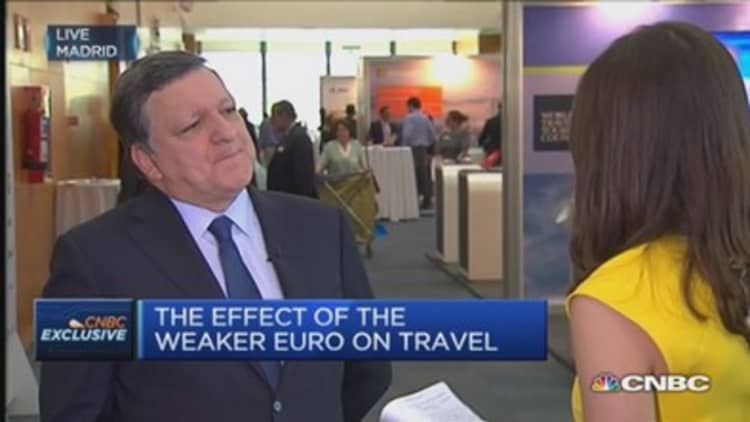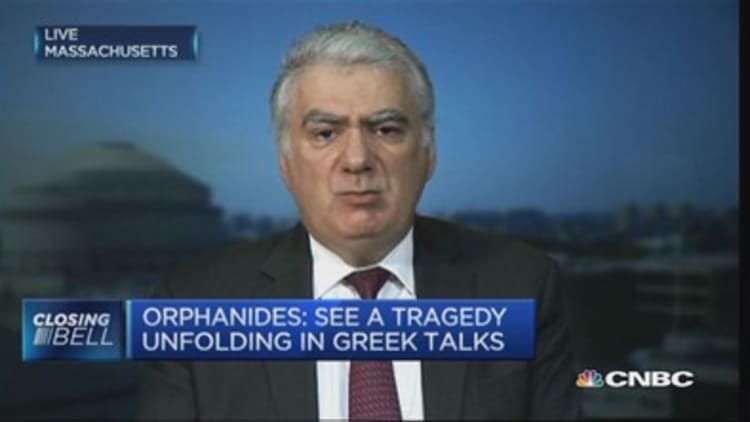
The risks of Greece leaving the euro zone are higher now then at the onset of the euro zone debt crisis, the former president of the European Commission told CNBC on Wednesday—shortly before Standard & Poor's downgraded Greece's credit rating to CCC-plus.
Jose Manuel Barroso led the European Commission (the European Union's executive body) from 2004 to 2014, including during the worst years of the region's debt crisis.
On Wednesday, the former leader said there was a risk that Greece would be unable to come to an agreement with it euro zone creditors in ongoing discussions about what reforms it should instigate as a precursor to the release of further aid. This could increasing the risk of the country defaulting on its debt obligations or having to leave the euro zone.
"I think there is a risk in the end that there is no positive outcome. I think that risk is higher today them some years before, when I was in the Commission. I continue to think that it would be a bad precedent, it would be a taboo that is broken," Barroso told CNBC, speaking from a conference on tourism in Madrid.
"The Greek government lacks experience but they should understand that they have to comply with the rules of the euro zone. At the same time, the other 18 governments of the euro zone should show solidarity because the Greek people have gone through an extremely difficult situation—some flexibility should be allowed," Barroso told CNBC.
Barroso's comments follow remarks from an opposition member of the Greek parliament, who told CNBC Wednesday that debt default in Greece would be "completely catastrophic" and a scenario that Athens should avoid at all costs.

The clock is ticking for Athens to propose a package of reforms agreeable to its international lenders, which would see them release loans that the country desperately needs to stay afloat.
Default would be 'catastrophic'
"I cannot assume or imagine this would be a conceivable option for Greece at the moment," Kyriakos Mitsotakis, a Greek politician with the conservative New Democracy Party, in response to a question about who would be to blame if the country defaults on its loans, told CNBC on Wednesday.
"It would be a completely catastrophic scenario and I'm sure that the government would want to avoid that at all costs."
Read MoreWhat would a Greek default look like?
Greece has been reliant on international aid from its two bailout programs since 2010, worth a combined 240 billion euros ($254 billion). As the coffers run low, Greece is hoping a last tranche of aid from its bailout program will be released, but the country has not yet instigated the reforms that creditors are demanding as a precondition.
Mitsotakis said the socialist government, led by Prime Minister Alexis Tsipras, had to take responsibility for the slow pace in securing a deal with its creditors.
"The pace of the current negotiations with the institutions we now call the Troika has been slow and the government has so far been unable to produce a credible reform package that would allow us to complete a deal with our European partners and receive the funding that our economy desperately needs," Mitsotakis told CNBC.
"We've provided, as opposition, ample support for the government to move in this direction, but unfortunately the government appears to be tied by its electoral rhetoric and is having difficulty to distance itself from the more extreme voices that still exist within the party, hence the current deadlock," he added.
Talk has grown in recent days that Greece's government could opt to call a snap election if it does not reach a deal on reforms with its European Union and International Monetary Fund lenders that would pave the way for further aid. However, Greece's state minister denied on Wednesday that Athens was considering an early election, Reuters reported.
Also on Wednesday, German Finance Minister Wolfgang Schauble said Tsipras' government had set back Greece's economy, which had been improving.
On the other hand, Athanasios Orphanides, a Cypriot economist who previously served as a member of the European Central Bank Governing Council, said that the key to solving the "terrible" impasse was in convincing Berlin of the dangers in taking a "hard line" on Greece.

Speaking on Wednesday to CNBC, Orphanides added that he admired how the European Central Bank was "handing the situation."

